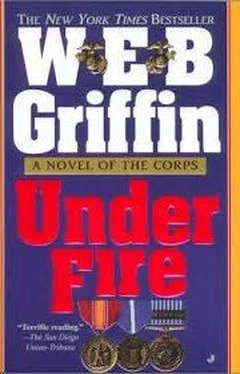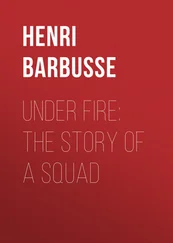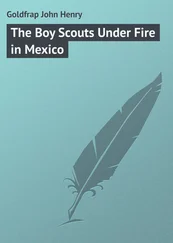Griffin W.E.B. - The Corps 09 - Under Fire
Здесь есть возможность читать онлайн «Griffin W.E.B. - The Corps 09 - Under Fire» весь текст электронной книги совершенно бесплатно (целиком полную версию без сокращений). В некоторых случаях можно слушать аудио, скачать через торрент в формате fb2 и присутствует краткое содержание. Год выпуска: 0101, Жанр: Старинная литература, на английском языке. Описание произведения, (предисловие) а так же отзывы посетителей доступны на портале библиотеки ЛибКат.
- Название:The Corps 09 - Under Fire
- Автор:
- Жанр:
- Год:0101
- ISBN:нет данных
- Рейтинг книги:5 / 5. Голосов: 1
-
Избранное:Добавить в избранное
- Отзывы:
-
Ваша оценка:
- 100
- 1
- 2
- 3
- 4
- 5
The Corps 09 - Under Fire: краткое содержание, описание и аннотация
Предлагаем к чтению аннотацию, описание, краткое содержание или предисловие (зависит от того, что написал сам автор книги «The Corps 09 - Under Fire»). Если вы не нашли необходимую информацию о книге — напишите в комментариях, мы постараемся отыскать её.
The Corps 09 - Under Fire — читать онлайн бесплатно полную книгу (весь текст) целиком
Ниже представлен текст книги, разбитый по страницам. Система сохранения места последней прочитанной страницы, позволяет с удобством читать онлайн бесплатно книгу «The Corps 09 - Under Fire», без необходимости каждый раз заново искать на чём Вы остановились. Поставьте закладку, и сможете в любой момент перейти на страницу, на которой закончили чтение.
Интервал:
Закладка:
`Tell her to bring her camera, Sergeant," McCoy or-dered.
As Jeanette Priestly followed Zimmerman and the ser-geant through the narrow building, there were looks of dis-belief on the faces of the regimental officers and soldiers.
"With the caveat that I don't think you should be here," the colonel said, "welcome to the 34th Infantry, Miss Priestly."
"Thank you," she said, and looked at McCoy. "What's up?"
"There're three North Korean prisoners in there," Mc-Coy said, pointing. "I want you to take their picture. Plural. Pictures."
"And then you take my film, right?"
"No. I don't want your film. When you have it processed in Tokyo, I'm sure they'll make prints for G-2. Ernie, you go in there and see if you think any of them speak Chinese. The little guy in the good boots is, I suspect, an officer. He's not going to say much, but if you think one of the oth-ers speaks Chinese, take him someplace and see what he knows. They're from the 83rd Motorcycle Regiment."
Zimmerman nodded. "Aye, aye, sir."
"I would like to use the ladies' room," Jeanette an-nounced.
"I'm afraid we can't offer you much, Miss Priestly," the colonel said.
"I didn't expect that you could," she said, and smiled dazzlingly at him. "Why don't you call me `Jennie,' Colonel. We're friends, right?"
"Sergeant, escort Miss Priestly to the latrine, and stand guard," the colonel ordered. Then he turned to McCoy. "Would you like to have a look at the map, Captain?"
"Yes, sir. Thank you."
The map, covered with transparent celluloid, was mounted on a sheet of plywood against the wall behind the colonel's desk.
"Here we are now, the regiment-and the division- strung out along the Kum River." He pointed.
"Yesterday morning, Item Company of my 3rd Battal-ion, here, on the south bank of the Kum, was brought under tank fire at about 0600-first light. No real damage was done, but the artillery forward observer couldn't come up with the coordinates of the tanks, so we couldn't hurt them either.
"About the same time, an outpost of Love Company- here on the far left flank-reported seeing two barges ferrying North Koreans across the river two miles to their west. Accidentally, or intentionally, they were out of range of any of our artillery.
"By 0930, they had five hundred men across the river. The North Korean artillery was working, and they brought Love Company under fire, at about the same time as did the mortars of the North Koreans who had crossed the river: 0935 to 0940."
The colonel stopped and looked at McCoy.
"Have you ever been under mortar and artillery fire, Cap-tain? Or have you spent your entire career in intelligence?"
"I've been under fire, sir."
"More than once?"
"Yes, sir."
"Do you remember the first time?"
"Yes, sir."
"Where was that?"
"In the Philippines, sir. The Japanese used naval gunfire before landing."
"Were you afraid?"
"Very much, sir."
"Did you `withdraw'?"
"Sir?"
"Did you `withdraw'-the new word for that is `bug out'?"
"No, sir."
"Do you remember why not?"
"No, sir," McCoy said. "We were there to try to repel the landing barges."
"My first time was in Italy," the colonel said. "I shat my pants. But I didn't bug out."
"Sir?"
"The company commander of Love Company, Captain, within minutes of coming under fire, `withdrew.' Not only personally, but ordered his soldiers to do likewise."
McCoy did not reply.
"As it turned out," the colonel went on, "it wasn't as bad as it could have been. The artillery fire on Love Company was apparently a diversionary attack to conceal their real intention, which was to move to the south in this direc-tion-he pointed-and sever the road here. If they had at-tacked the deserted positions of Love Company..."
"I think I get the picture, sir," McCoy said.
"I relieved the officer in question, of course, as soon as what he had done came to my attention, but I didn't come into that information until some time after it happened. By that time-several hours later, whatever time it took them to move three miles against virtually no opposition-ap-proximately three hundred North Korean infantry were here, on this road, near the village of Samyo.
"So was the 63rd Field Artillery Battalion, 105-mm howitzers. They had been providing much of my artillery support. The North Koreans launched an immediate attack against them. Tell me, Captain, how are Marine can-noneers armed?"
"Sir?"
"Are they armed with carbines?"
"I'm not sure. It's my understanding that the officers, and some senior non corns, can elect to carry carbines..."
"But the junior NCOs and privates have Ml Garands, and are trained in their use?"
"Sir, every Marine is a rifleman."
"There were very few Garands in the 63rd Field Ar-tillery," the colonel said, matter of factly, "which is the ex-planation offered for the failure of the 63rd to adequately defend itself by an officer who managed to escape the de-bacle there."
"Sir?"
"Wouldn't you agree that roughly two hundred men- which was the strength of the 63rd-should be able to hold out longer than two hours against three hundred infantry, not supported by artillery?"
"Yes, sir, I would."
"The enemy attacked the 63rd at approximately 1330. By 1530, the enemy had killed or captured all but a lucky few officers and men who managed to escape, and cap-tured all of the 63rd Field's vehicles, cannon, and a consid-erable supply of ammunition."
"They got all the guns?" McCoy asked, incredulously.
"All of them. And before the 63rd was able to spike them," the colonel said, confirmed.
"Jesus!" McCoy said.
"At about this time," the colonel went on, "Item Company learned for the first time that Love Company had bugged out, and that the enemy was astride its road to the rear. The company commander asked for permission to withdraw, and 3rd battalion commander recommended that it be granted; he said that he didn't think the re-formed Love Company- he described them as `demoralized'-could be trusted to counterattack and reopen the road behind Love Company. I gave permission for the withdrawal."
The colonel let that sink in and then went on.
"It was necessary for them to `withdraw' over the moun-tains-the roads were in enemy hands-and they eventu-ally made it here. Without a substantial percentage of their crew-served weapons, which simply could not be carried over the mountains."
The colonel gave McCoy time to absorb that, and then went on:
"I have no reason, Captain, to believe that the 19th In-fantry will fare any better than the 34th has, for the same reasons. One of the reasons I believe that to be true is that the division's third regiment, the 21st Infantry, in three days of fighting, has lost about half its officers and men."
"Half?"
"Half," the colonel confirmed. "What was left of the 21st was gathered near Taejon, and reorganized. Reorga-nized, rather than reconstituted, which implies bringing a unit up to strength. There is no replacement system in place from which replacements for losses can be drawn. What happened to the 21st is that an attempt has been made to form companies and battalions from its remnants.
"What that means, of course, is that when the 21st goes back into combat, very few, if any, of the men will have served*-much less trained-together. Moreover, because many officers are among the dead and missing, many com-panies-perhaps most-will be commanded by lieutenants who were platoon leaders four days ago, and many pla-toons will be led by sergeants. In some cases, corporals.
"Early this morning, the 21st was trucked from Taejon to Okchon, here." He pointed on the map. "That's about ten miles east of Taejon. They have been ordered to set up positions here, on the Seoul-Pusan highway, about halfway between Okchon and Taegu. If the enemy elects to attack down the highway-or to take the high ground on either side of the highway-resistance to those sort of moves will obviously be hindered by the lack of artillery. In fact, I sus-pect that when the North Koreans attack, their assigned ar-tillery will be augmented by the 105-mm tubes the 63rd Field lost."
Читать дальшеИнтервал:
Закладка:
Похожие книги на «The Corps 09 - Under Fire»
Представляем Вашему вниманию похожие книги на «The Corps 09 - Under Fire» списком для выбора. Мы отобрали схожую по названию и смыслу литературу в надежде предоставить читателям больше вариантов отыскать новые, интересные, ещё непрочитанные произведения.
Обсуждение, отзывы о книге «The Corps 09 - Under Fire» и просто собственные мнения читателей. Оставьте ваши комментарии, напишите, что Вы думаете о произведении, его смысле или главных героях. Укажите что конкретно понравилось, а что нет, и почему Вы так считаете.










